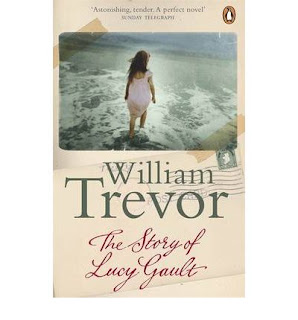“But nervous of doing more harm
than good, she said nothing” (p138)
As our novel opens, in 1921, Lucy Gault is a young girl, an
only child, living in an elaborate Irish Estate with her parents and hired
help. The house is under siege as Lucy’s father served in the Army and the
locals want to teach him a lesson by raising his mansion to the ground. Captain
Edward Gault (Lucy’s father) wounds a boy by shooting him in the shoulder and
although reconciliation is sought, none is forthcoming and the Gault’s are
forced to leave their home in search of peace abroad.
Of course Lucy is not consulted in this decision and she
decides to run away, fleeing to the house of their recently redundant
housekeeper, but on her journey she badly damages her ankle and can’t continue.
Lucy’s parents believe she has drowned and leave Ireland in grief. Lucy is of
course found alive by Henry, the hired help who stays on at the estate, and
despite various attempts at finding her parents, there is no success. Lucy
waits for their return:
For her part, Lucy did not wonder
much about the nature of exile, accepting, with time, what had come about, as
she did her lameness and the features that were reflected in her looking-glass.
Had Canon Crosbie raised with her the question of going out into the world, she
would have replied that the nature and tenets of her life had already been laid
down for her. She waited, she would have said, and in doing so kept faith. Each
room was dusted clean; each chair, each table, each ornament was as they were
remembered. Her full summer vases, her bees, her footsteps on the stairs and on
the landings, and crossing rooms and in the cobbled yard and on the gravel,
were what she offered. She was not lonely; sometimes she could hardly remember
loneliness. ‘Oh, but I’m happy,’ she would have reassured the clergyman had he
asked her. ‘Happy enough, you know.’
This is a novel with a lot of contemplative passages, one
where the futility of existence is explored through menial tasks, where
unrequited love is blamed on fate, where it is easier to say nothing than to
express one’s true feelings. Lucy’s mother and father maintain their marriage,
each knowing the grief and pain the other is experiencing but never uttering a
word, never offering support. The theme of not expressing one’s feelings is
deeply interwoven in Lucy’s very fabric and her lack of verbalising her
concerns about moving away at the start of the novel haunt her through every
action thereafter – she can’t express love, her emotions are stifled, she merely
exists.
A finely constructed work, that seems as though there is not
a single word out of place, but personally one that was an easy read but where
I couldn’t engage with any character, where Lucy’s fate did not really move me
and the story, style or structure did not challenge me in any way. Completely
inoffensive so it is hard to be critical of this work, but it will be one I
will surely forget I’ve ever read. Have I moved on from the Booker Prize? Good
grief……

I had that same thought as I read this one - oh no have I read too many Bookers that I am totally unmoved now?? I took a bit of time off after this one. But I think it was the book and not the Bookers.
ReplyDelete